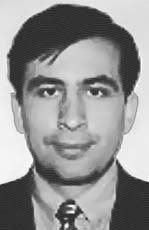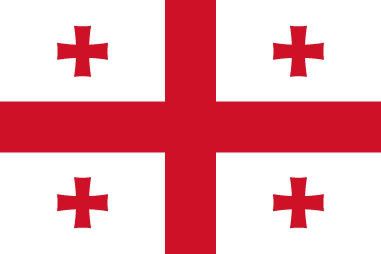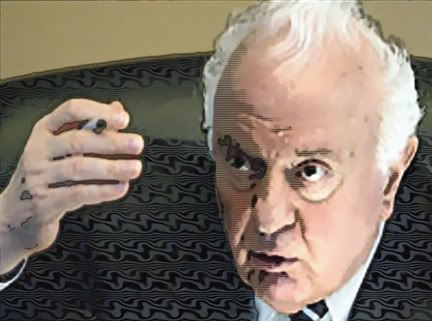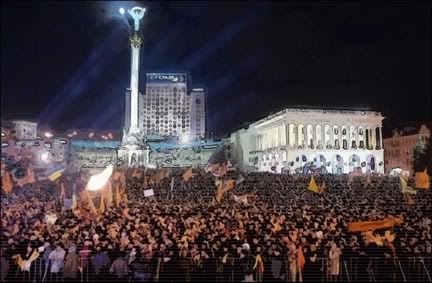Adam Larson / Caustic Logic
Guerillas Without Guns/Chapter 5
Posted February 2007
While useful to Washington, Shevardnadze was ever more unpopular with his own people, whose patience was wearing thin on territorial integrity and those economic issues as well as widespread official corruption, which the president seemed incapable of stopping. Presented in 1999 by his old friend James Baker with the esteemed “Enron Prize for Distinguished Public Service,” by 2003 Shevardnadze’s government was increasingly seen as plagued with corruption, mismanagement, and secrecy. [1] These problems steadily drained Shevardnadze’s power like a hole in his gas tank and strategically vital Georgia began to look rather vulnerable to another round of instability and violence, sure to put the brakes on any pipeline with a “T” in the middle. Major protests had been staged off-and-on since 2001; criticism from the media was squashed with raids on the opposition stations, while political protest was met with dismissal of the government. US Secretary of State Colin Powell announced at one point “an unstable Georgia automatically results in an unstable Caucasus,” a statement some took to mean that rather than expend more political capital propping Shevy up, the Americans should “ditch him to ensure stability.” [2]
There are certainly other reasons as well for the US to support Shevardnadze’s ouster, like the attractiveness of the well-formed, popular, and more firmly pro-West opposition leader - 36-year-old Mikhail Saakashvili. His role in this episode is the U.S.-supported front-runner who had spent years cultivating an image as a youthful, optimistic crusader against corruption and the forces of the old. Saakashvili is a skillful demagogue, promising a brighter, more liberal future aligned less with Moscow than with London and Washington – pure gold for frustrated voters, especially the young and naïve.
Saakashvili was born in Tbilisi, but came to power as an international man, reportedly fluent in seven languages. He is married to a Dutch woman, Sandra Saakashvili-Roelofs, a human rights crusader, founder of the humanitarian foundation SOCO, and author of the autobiography The Story of an Idealist (2005). Not only is she Saakashvili’s Western wife, illustrating his desire to marry Georgia into Europe, the two also met and solidified their partnership in the system and cities of the Euro-Atlantic community.
 |
He also studied at the International Institute of Human Rights in Strasbourg, France, where in 1993 he met fellow student Sandra. The two of them wed quickly and moved to New York where she worked at Columbia while he studied there, and later she worked at a Dutch law firm while he worked with an American one in Manhattan during 1995. They were busy people. Not a lot of time for romance I would guess.
Later that year, Mikhail was approached in New York by his old Georgian friend Zurab Zhvania, then working on behalf of President Shevardnadze to recruit promising young Georgians to join his party, the Georgian Citizens Union. By the end of the year, Saakashvili and Zhvania had both returned home and won elections for seats in parliament, serving together under the party’s banner. Sandra relocated with Mikhail and worked for the International Committee of the Red Cross and at the Consulate of the Kingdom of the Netherlands in Tbilisi. [3] (keep the red cross in mind when looking at the new flag adopted after the Sakkashvilis came to power - coincidence?)

Next: A Warm Relationship: Kmara, Soros, Saakashvili
Sources:
[1] Cohen, Ariel. “Shevardnadze’s Journey.” Policy Review Online. April/May 2004. http://www.policyreview.org/apr04/cohen.html
[2] Feinberg, Leslie. “Washington and the coup in former Soviet Georgia.” Worker’s World. January 22, 2004. Accessed at: http://www.workers.org/ww/2004/georgia0122.php
[3] Sandra Roelofs Biography and Activity. Communications Office of the President of Georgia. 2005. http://www.president.gov.ge/?l=E&m=2
[4] Georgian Justice Minister resigns. RFE/RL Newsline, Vol. 5, No. 179. September 20 2001.
http://www.hri.org/news/balkans/rferl/2001/01-09-20.rferl.html
[5] Areshidze, Irakly “Georgia’s Mounting Opposition.” Eurasianet. January 21 2003.
http://www.eurasianet.org/departments/rights/articles/eav012103.shtml
[6] Areshidze, Irakly “Tbilisi City Council Controversy Deals Blow to Political Opposition in Georgia.” Eurasianet. November 12 2002. http://www.eurasianet.org/departments/insight/articles/eav111202a.shtml
[7] Traynor, Ian. “US campaign behind the turmoil in Kiev.” The Guardian. November 26 2004. http://www.guardian.co.uk/ukraine/story/0,15569,1360236,00.html




